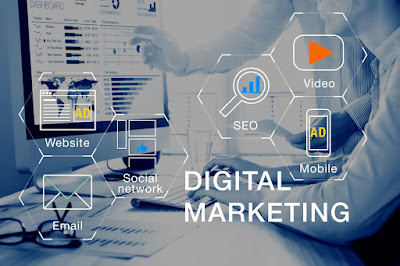What Is Digital Marketing And How It Works - Comprehensive Guide
Here's how it works:
1. Identifying your audience and goals:
- The first step is understanding who you want to reach and what you want to achieve with your marketing efforts. This could be increasing brand awareness, generating leads, driving sales, or building customer loyalty.
2. Choosing the right channels:
- Once you know your audience and goals, you can choose the most relevant digital channels to reach them. Popular channels include social media, search engines, email marketing, content marketing, display advertising, video marketing, and influencer marketing.
3. Creating engaging content:
- To capture your audience's attention, you need to create high-quality content that is relevant, informative, and engaging. This could be blog posts, infographics, videos, social media updates, or email newsletters.
4. Targeting and personalization:
- Digital marketing allows you to target your messages to specific audiences based on their demographics, interests, and online behavior. This ensures that your content reaches the right people and resonates with them.
5. Measuring and analyzing results:
- Tracking and analyzing your results is crucial for understanding what's working and what's not. This allows you to optimize your campaigns and improve your results over time.
Here are some of the benefits of digital marketing:
- Wider reach: You can reach a global audience with your marketing message.
- Greater targeting: You can target your marketing to specific audiences.
- Measurability: You can track and measure the results of your campaigns.
- Cost-effectiveness: Digital marketing can be more cost-effective than traditional marketing methods.
- Personalization: You can personalize your marketing messages to individual customers.
Overall, digital marketing is a powerful tool that can help businesses of all sizes achieve their marketing goals. By understanding the basics and implementing effective strategies, you can reach your target audience, build relationships, and drive results.
Some Tools You Can Start Digital Marketing With.
Here are some popular platforms categorized by their key functions and how they contribute to your overall digital marketing strategy:
Website & Content Management:
- WordPress: Powerful, customizable, and user-friendly platform for building and managing websites and blogs. Ideal for creating content, landing pages, and managing SEO.
- Wix: Drag-and-drop website builder with easy-to-use interface and beautiful templates. Perfect for beginners and creating simple websites.
- HubSpot CMS: Scalable platform with integrated marketing tools for content creation, marketing automation, and analytics. Great for growing businesses and managing complex workflows.
Social Media Management:
- Hootsuite: All-in-one platform for scheduling, publishing, and managing social media posts across multiple platforms. Helps with social media listening, engagement, and analytics.
- Sprout Social: Similar to Hootsuite, but offers advanced features like social media listening, reporting, and influencer marketing tools. Useful for larger teams and comprehensive social media strategies.
- Buffer: Simple and user-friendly platform for scheduling and publishing social media posts. Best for individuals and small businesses managing a few social media profiles.
Email Marketing:
- Mailchimp: Popular platform for creating and sending email newsletters, campaigns, and automated email sequences. Great for beginners and managing basic email marketing needs.
- Constant Contact: Offers robust email marketing features, including advanced automation, segmentation, and reporting tools. Suitable for growing businesses and more complex email strategies.
- Drip: Ecommerce-focused email marketing platform with features designed to nurture leads and drive sales. Perfect for online stores and businesses with sales funnels.
Search Engine Optimization (SEO):
- Semrush: All-in-one SEO toolkit for keyword research, competitor analysis, website audits, and backlink monitoring. Helps websites improve organic search ranking and visibility.
- Ahrefs: Another comprehensive SEO tool offering similar features to Semrush, focusing on backlink analysis and competitor research. Best for advanced SEO specialists and agencies.
- Moz: Provides SEO tools and resources, including keyword research, on-page optimization suggestions, and link building guidance. Helpful for beginners and learning SEO basics.
Analytics & Reporting:
- Google Analytics: Free web analytics platform offering insights into website traffic, user behavior, and marketing campaign performance. Essential for tracking website data and understanding your audience.
- Facebook Insights: Provides detailed analytics about your Facebook page performance, audience demographics, and post engagement. Valuable for analyzing social media marketing efforts.
- Mixpanel: Product analytics platform that helps track user behavior across your website and app, understand user journeys, and measure product engagement. Best for product-based businesses and optimizing user experience.
Remember, these are just a few examples, and many other excellent platforms exist within each category. The key is to choose the tools that best align with your specific needs and budget, experiment, and track your results to see what works best for your digital marketing strategy.

Join the conversation